
Law and Justice Minister Kiren Rijiju on Thursday while responding to queries in parliament stated that the appointment of judges of the Supreme Court and High Court is made under Articles 124, 217 and 224 of the Constitution of India which do not provide for reservation for any caste or class of persons.
The Government has, however, been requesting the Chief Justices of the High Courts that while sending proposals for the appointment of judges, due consideration be given to suitable candidates belonging to Scheduled Castes, Scheduled Tribes, Other Backward Classes, Minorities and Women to ensure social diversity in appointment of judges in the High Courts, said Rijiju.
Enabling representation of women judges in the High Courts against the sanctioned strength of 1108 Judges 775 Judges are working as of 31 January, out of which 106 are women Judges which makes 9.5 per cent women Judges of the working strength in the High Courts, Law and Justice Minister said. While responding to the queries in Parliament, Kiren Rijiju also said that the appointment of Judges and Judicial Officers in the District and Subordinate Courts falls within the domain of the High Courts and State Governments concerned.
The Supreme Court of India, through a judicial order in January 2007 in the Malik Mazhar Sultan case, stipulated that the process for recruitment of judges in subordinate courts would commence on March 31 of a calendar year and end by 31 October of the same year. In the said case, the Supreme Court, taking suomoto cognisance of a large number of judicial vacancies in lower courts, directed State Governments/UTs and Registrars General of jurisdictional High Courts to inform the position regarding filling up of judicial vacancies. The Supreme Court is monitoring the filling up of vacancies under the said judicial order.
Rijiju while replying to the queries also informed the Parliament that 768 Fast Track Special Courts were established under the Scheme of FTSCs, including 418 POCSO courts to deal with Rape and POCSO cases. Providing quicker justice to survivors. Meanwhile, Rijiju further told the Parliament that on as of 30 January, against the sanctioned strength of 34 Judges, 27 Judges are working in the Supreme Court, leaving 7 vacancies.
Supreme Court Collegium (SCC) has recently made 7 recommendations to fill up all the vacancies of Judges in the Supreme Court. Rijiju also informed the Parliament that as on January 30, against the sanctioned strength of 1108 judges in various High Courts, 775 judges are working and 333 posts of Judges are vacant in the High Courts. “142 proposals recommended by the High Court Collegiums are at various stages of processing. Out of these 142, 4 proposals are pending with the Supreme Court Collegium and 138 are under various stages of processing in the Government,”